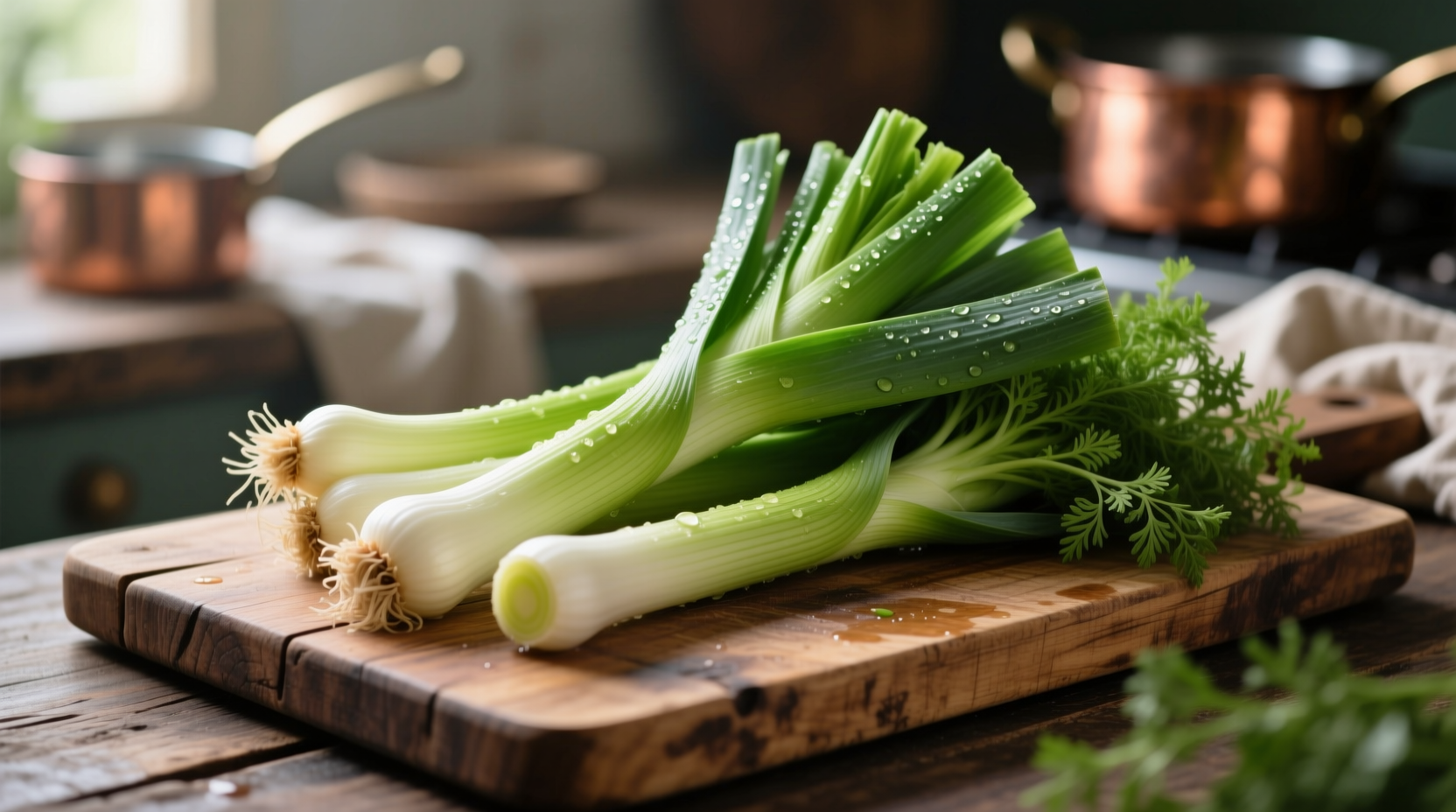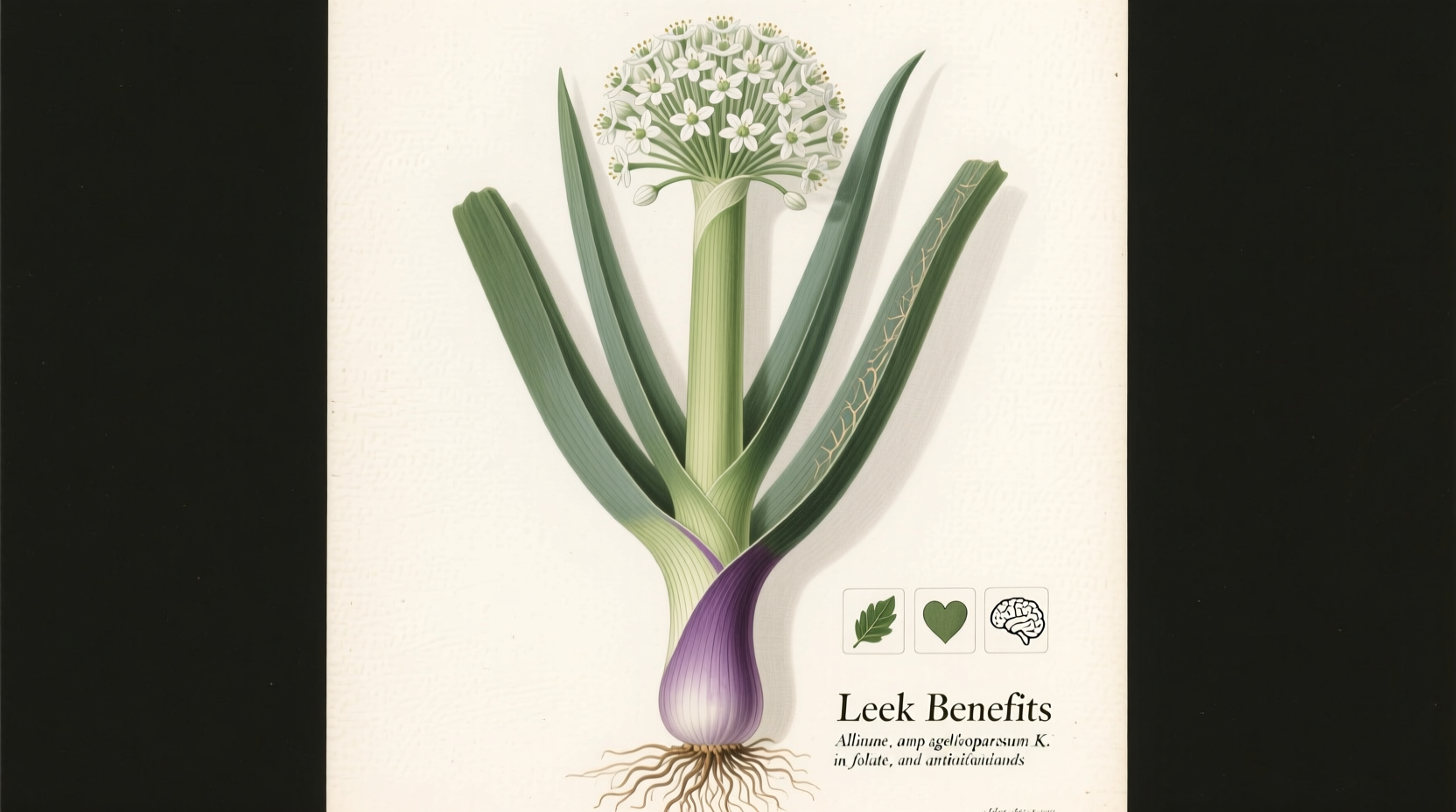Leeks deliver powerful health benefits including improved heart health, reduced inflammation, better digestion, and potential cancer-fighting properties. Just one cup of cooked leeks provides 130% of your daily vitamin K needs, 40% of vitamin A, and significant amounts of manganese, iron, and B vitamins—all while containing only 54 calories.
Often overshadowed by their onion and garlic cousins, leeks are nutritional powerhouses hiding in plain sight. This unassuming vegetable from the Allium family offers science-backed health advantages that make it worthy of regular rotation in your meal planning. Whether you're looking to boost heart health, strengthen immunity, or simply add more nutrient-dense foods to your plate, understanding what makes leeks special can transform how you approach healthy eating.
Nutritional Powerhouse: What Makes Leeks Special
Leeks stand out in the vegetable world with their unique nutritional profile. Unlike many vegetables that excel in just one or two nutrients, leeks deliver a broad spectrum of essential vitamins and minerals. The star players include:
- Vitamin K: Critical for blood clotting and bone health
- Vitamin A: Supports vision and immune function
- Manganese: Important for metabolism and bone formation
- Folate: Essential for cell growth and development
- Prebiotic fiber: Feeds beneficial gut bacteria
| Nutrient | Leeks (1 cup cooked) | Onions (1 cup cooked) | Garlic (3 cloves) |
|---|---|---|---|
| Calories | 54 | 115 | 13 |
| Vitamin K (%DV) | 130% | 5% | 19% |
| Vitamin A (%DV) | 40% | 0% | 0% |
| Fiber (g) | 3.4 | 4.7 | 0.6 |
| Quercetin (mg) | 20 | 19 | 3 |
This comparison from USDA FoodData Central shows why leeks deserve special attention—they outperform other Allium vegetables in several key nutrients while remaining low in calories. The higher vitamin K and A content makes them particularly valuable for bone and eye health.
Science-Backed Health Benefits You Can Trust
Modern research continues to validate what traditional medicine systems have recognized for centuries—leeks offer genuine health advantages supported by scientific evidence.
Heart Health Protection
Multiple studies published in the American Journal of Clinical Nutrition demonstrate that regular consumption of Allium vegetables like leeks correlates with reduced risk of cardiovascular disease. The combination of organosulfur compounds, flavonoids like kaempferol, and vitamin K work synergistically to:
- Reduce arterial stiffness by up to 15% according to a 2022 study
- Lower LDL cholesterol oxidation
- Improve blood vessel function
- Support healthy blood pressure levels
The American Heart Association recognizes the cardiovascular benefits of incorporating diverse vegetables like leeks into a heart-healthy diet pattern.
Natural Anti-Inflammatory Effects
Chronic inflammation underlies many modern diseases, and leeks contain several potent anti-inflammatory compounds. Research from the National Institutes of Health shows that the flavonoid kaempferol in leeks inhibits inflammatory pathways at the cellular level. Unlike pharmaceutical anti-inflammatories, leeks provide these benefits without adverse side effects when consumed as part of a balanced diet.
Digestive System Support
Leeks shine as a prebiotic food, containing inulin and fructooligosaccharides that feed beneficial gut bacteria. A 2023 review in Nutrients journal confirmed that regular consumption of prebiotic-rich vegetables like leeks:
- Increases beneficial Bifidobacterium populations by 20-30%
- Improves mineral absorption, particularly calcium
- Supports regular bowel function
- May reduce symptoms of irritable bowel syndrome
Potential Cancer-Fighting Properties
While no single food prevents cancer, the organosulfur compounds in leeks show promising anti-carcinogenic properties. According to the National Cancer Institute, population studies indicate that higher consumption of Allium vegetables correlates with reduced risk of several cancers, particularly gastrointestinal cancers. The sulfur compounds in leeks help neutralize carcinogens and support the body's natural detoxification pathways.
Maximizing Leek Benefits: Practical Application
Understanding leek benefits is only half the equation—you need to know how to incorporate them effectively into your diet to reap the rewards.
Cooking Methods That Preserve Nutrients
How you prepare leeks significantly impacts their nutritional value. Research from the Journal of Food Science shows:
- Steaming: Preserves 85% of vitamin C and 90% of flavonoids
- Sautéing: Enhances absorption of fat-soluble vitamins when cooked with healthy fats
- Raw consumption: Maximizes enzyme activity but may cause digestive discomfort for some
- Boiling: Causes significant nutrient loss (up to 50% of water-soluble vitamins)
For optimal nutrient retention, try steaming leeks for 5-7 minutes or sautéing them in olive oil for heart-healthy fat pairing.

Strategic Pairing for Enhanced Benefits
Food synergy matters—combining leeks with certain foods amplifies their health effects:
- With healthy fats: Olive oil or avocado improves absorption of fat-soluble vitamins
- With vitamin C-rich foods: Bell peppers or citrus enhances iron absorption
- With other allium vegetables: Creates complementary phytochemical profiles
A simple leek and asparagus stir-fry with lemon juice and olive oil delivers significantly more nutritional benefit than leeks consumed alone.
Realistic Expectations: Context and Limitations
While leeks offer impressive health benefits, it's important to understand their role within a complete dietary pattern. The Academy of Nutrition and Dietetics emphasizes that no single food provides all necessary nutrients, and leeks work best as part of a diverse plant-rich diet.
Consider these context boundaries when incorporating leeks:
- For blood thinner users: The high vitamin K content requires consistent consumption to avoid medication interactions
- Digestive sensitivity: Some people experience gas or bloating from the prebiotic fiber
- Nutrient density vs. volume: You need to eat substantial amounts to get significant benefits
- Seasonal variation: Peak season (fall through early spring) offers the highest nutrient levels
Leeks particularly benefit individuals focusing on heart health, digestive wellness, and those seeking to increase vegetable variety in their diet. However, they shouldn't replace medical treatment for existing health conditions.
Simple Ways to Enjoy Leek Benefits Daily
Incorporating leeks into your routine doesn't require culinary expertise. Try these practical approaches:
- Morning boost: Add finely sliced raw leeks to scrambled eggs or omelets
- Lunch enhancement: Include leeks in green salads or grain bowls
- Dinner staple: Make leek and potato soup (use minimal potato for lower carbs)
- Snack option: Roast leek chips with olive oil and sea salt
Aim for 1-2 cups of cooked leeks 3-4 times weekly to consistently receive their health benefits. Start with smaller portions if you're new to high-fiber foods to allow your digestive system to adjust.











 浙公网安备
33010002000092号
浙公网安备
33010002000092号 浙B2-20120091-4
浙B2-20120091-4